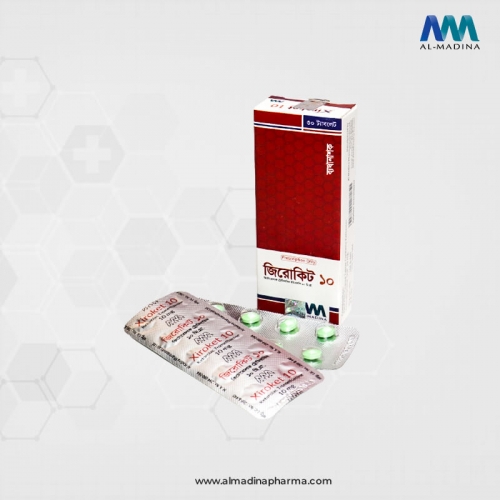ঔষধের বিস্তারিত বা বিকল্প ঔষধ জানতে ঔষধের নাম দিয়ে সার্চ দিন। যেমন- Napa বা Alatrol বা Amodis
Xiroket 10mg
TabletKetorolac Tromethamine
Al-Madina Pharmaceuticals Ltd
Other Strength:
Alternative:
- Xidolac Meltab 10mg
- WINOP 10mg
- Torax 10mg
- Zeropain 10mg
- Toramax 10mg
- Minolac 10mg
- Analac 10mg
- Ketofast 10mg
- Doltro 10mg
- Tolec 10mg
- Toro 10mg
- Ketoroz 10mg
- Ketobe 10mg
- Lacor 10mg
- Rolac 10mg
- Rolac MDT 10mg

Xiroket
Indication: XIROKET tablets are indicated for the short-term management of moderate postoperative pain.
Composition:XIROKET Tablet: Each film coated tablet contains Ketorolac Tromethamine USP 10 mg.
Therapeutic Class: Analgesic & Antipyretic
Pharmacology: XIROKET is a potent analgesic of the non-steroidal anti-inflammatory drugs (NSAID). It inhibits the cyclo-oxygenase enzyme system and hence prostaglandin synthesis. Thus it gives minimal inflammatory effect at its analgesic effect.
Dose and administration:
Tablets: The recommended oral dose of XIROKET is 10 mg every 4 to 6 hours for pain as required. Doses exceeding 40 mg per day are not recommended. For patients receiving Ketorolac Tromethamine ampoules, and who are converted to XIROKET tablets, the total combined daily dose should not exceed 90 mg (60 mg for the elderly, renal-impaired patients and patients less than 50 kg) and the oral component should not exceed 40 mg on the day the change of formulation is made. Patients should be converted to oral treatment as soon as possible.
A total daily dose of 90 mg for non-elderly and 60 mg for the elderly, renal-impaired patients and patients less than 50 kg should not be exceeded.
Geriatric Use (265 Years of Age): Because ketorolac tromethamine may be cleared more slowly by the elderly who are also more sensitive to the dose-related adverse effects of NSAIDs, extreme caution and reduced dosages and careful clinical monitoring must be used when treating the elderly with ketorolac tromethamine.
Contraindication: Ketorolac Tromethamine is contraindicated in patients with known hypersensitivity to NSAIDs and any of the components of Ketorolac Tromethamine. Moreover, the patient with the history of asthma, nasal polyp, angioedema, peptic ulcer and bleeding, bleeding disorders are contraindicated for this drug.
Warning and Precaution: Patients over the age of 65 years may be at a greater risk of experiencing adverse events than younger patients. Ketorolac tromethamine can cause gastro-intestinal irritation, ulcers or bleeding in patients with or without a history of previous symptoms. Bronchospasm may be precipitated in patients with a history of asthma. Since ketorolac tromethamine and its metabolites are excreted primarily by the kidney, patients with moderate to severe impairment of renal function (serum creatinine greater than 160 micromol/l) should not receive. Fluid retention and oedema have been reported with the use of Ketorolac tromethamine.
Side effects: a) Commonly occurring side-effects are nausea, vomiting, gastro-intestinal bleeding, melaena, peptic ulcer, pancreatitis, anxiety, drowsiness, dizziness, headache, hallucinations, excessive thirst, inability to concentrate, insomnia, malaise, fatigue, pruritus, urticaria, skin photosensitivity, Lyell’s syndrome, Stevens Johnson syndrome, flushing, b) Rear: bradycardia, hypertension, palpitations, chest pain, infertility in female, dyspnoea, asthma, pulmonary edema, fever, injection site pain.
Use in pregnancy & lactation: Safety in human pregnancy has not been established. Ketorolac has been detected in human milk at low levels. Ketorolac is therefore contraindicated during pregnancy, labour or delivery, or in mothers who are breast feeding.
Use in children & adolescents: Pediatric Use, Ketorolac tromethamine is not indicated for use in pediatric patients. The safety and effectiveness of ketorolac tromethamine oral in pediatric patients below the age of 17 have not been established.
Drug interaction:
a) With Medicine: Ketorolac tromethamine should not be used with other NSAIDs, aspirin, anti-coagulants Ketorolac, other non-steroidal anti-inflammatory drugs, the anti-hypertensive effect of beta-blockers and ACE inhibitors, particularly in volume depleted patients. Caution is advised when methotrexate is administered concurrently, since some prostaglandin synthesis inhibiting drugs have been reported to reduce the clearance of methotrexate, and thus possibly enhance its toxicity. Probenecid should not be administered
b) With Food and others: should not take with alcohol (ethanol) and milk.
Overdose:
Symptoms: Abdominal pain, nausea, vomiting, hyperventilation, peptic ulceration, erosive gastritis and renal dysfunction.
Management: Symptomatic and supportive treatment. Consider gastric lavage or admin of activated charcoal within 1 hr. of ingestion.
Storage: XIROKET Tablet should be store below 30° C in a dry place, protect from light & moisture. Medicines keep out of reach of children
Packing: XIROKET 10 tablet: Each box contains 3×10’s blister pack.
এই পাতাটি ২৪৬ বার দেখা হয়েছে
রাজডক কী?
ফ্রী সদস্য হোন Click Here
ডাক্তার হিসাবে যোগদান করতে Click Here
নার্স / টেকনোলজিস্ট হিসাবে যোগদান করতে Click Here
ফ্রী সদস্য হোন Click Here
ডাক্তার হিসাবে যোগদান করতে Click Here
নার্স / টেকনোলজিস্ট হিসাবে যোগদান করতে Click Here

